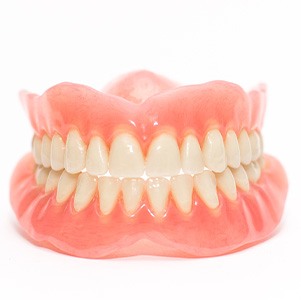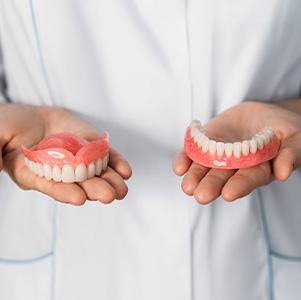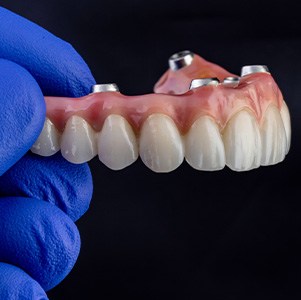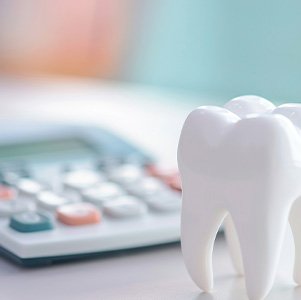Dentures & Partials – Colorado Springs
Enjoy a Full Smile Again

Dentures are prosthetic teeth attached to a gum-colored base, and they provide a natural-looking, stable solution for replacing several or a whole row of missing teeth. Here at Anderson Family Dental by Espire, we provide full and partial dentures in Colorado Springs.
Why Choose Anderson Family Dental by Espire for Dentures & Partials?
- Custom-designed prosthetics for every patient
- Implant-retained dentures available
- Partnered with the best local dental labs
Who Is a Good Candidate for Dentures?

Most people with moderate to extensive tooth loss can get dentures. When you attend a consultation with our team, we will carefully evaluate your situation, learn about your oral health, and determine what type of tooth replacement is best for you. If you are not currently a candidate for dentures, you may become one after some restorative treatments, such as gum disease therapy or other services that will prepare your mouth to support prosthetic teeth.
Effects of Missing Teeth

Missing teeth can be the result of injury, gum disease, severe decay, or other causes. Regardless of why your smile is no longer complete, you may be facing a number of difficulties. For example, individuals with missing teeth often find it difficult to eat a wide variety of foods. Your speech may also be adversely affected. It is even possible that your cheeks have a somewhat hollow, sunken look that makes you appear years older than you really are. All of these issues can have a great negative impact on both your self-esteem and your quality of life. Fortunately, dentures are often able to help.
What Qualifies You for Dentures?

Dentures may be ideal for you if:
- You have lost a significant number of teeth. (If you have only lost one or two teeth, a bridge might be a better option for you.)
- Your remaining natural teeth are extremely sensitive or suffering from severe decay.
- Your teeth are loose due to advanced gum disease.
- You are looking for a cost-effective way to rebuild your smile.
There are a few different types of dentures. During your consultation, we will determine if full dentures, partial dentures, or implant dentures are the best fit for your circumstances.
Alternative Tooth Replacement Options

If dentures are not right for you, we might suggest an alternative way to replace your lost teeth, such as:
- A fixed bridge. A bridge uses the remaining natural teeth for support. It is a strong and long-lasting way to replace 1 – 3 missing teeth in a row. If your natural teeth are still pretty strong, this solution may be perfect for you.
- Dental implants. Dental implants are prosthetic tooth roots. In addition to being able to support dentures, they can also support single crowns and multi-unit bridges. If your jawbone is strong enough to integrate successfully with implants, our team will likely recommend them as the best way to rebuild your smile, regardless of how many teeth you are missing.
Partial Denture

Just like the name suggests, a partial denture is one that replaces several missing teeth when some natural teeth are still present in the gums. The partial can be permanently fixed in place or left removable for easy cleaning. A fixed partial denture is more commonly called a bridge, and it is often used when several teeth are missing in a row. A removable partial can replace teeth from various parts of the mouth. When not secured with dental implants, partial dentures are held in place with a metal frame that clasps to the remaining teeth. The fixed bridge uses the surrounding teeth as anchors for the prosthetic teeth that fill the gap in between.
Full Denture

Also called a complete denture, full dentures replace an entire arch of missing teeth. A full denture can be held in place by dental implants, with natural suction, or through the use of denture adhesive. Many patients go through an adjustment phase wearing non-implant retained dentures. Don’t be alarmed if you notice sore spots on the cheeks or gums immediately after you receive your dentures – they will heal with time.
How Dentures Are Made

Once you commit to getting dentures, you may have some questions about what to expect during the treatment process. How are dentures made? What are they made out of? How long will you have to wait for your new prosthesis? While the process can vary slightly from case to case, there are some general steps that hold true for the vast majority of patients. Whether you are getting a full or partial denture, here is an overview of how your new teeth will come into being:
What Are Dentures Made Of?

Dentures consist of two main parts: the base and the artificial teeth. Here is a closer look at the materials that compose each section of your prosthetic:
- The base: The base of your dentures is designed to resemble your gums; it provides support for your new teeth. In most cases, it is made out of acrylic resin because it tends to be comfortable and flexible. In some cases, though, nylon or other materials are used. If you are getting a partial denture, metal clips may be attached to the acrylic base to help your teeth stay in place.
- The teeth: Usually, the teeth are made out of acrylic or porcelain. Both have their advantages. For example, porcelain offers beautiful aesthetics and outstanding durability. If you still have some natural teeth, though, acrylic may be better because it poses less risk of damaging your enamel.
The Denture Creation Process

The denture creation process usually goes like this:
- Impressions. Our team will take detailed impressions of your mouth. They will serve as the basis for designing your new teeth. We may also take some measurements of your jaw.
- Lab work. A dental laboratory will receive your impressions and a plaster model of your mouth. They will create a wax version of your gumline and then use a device known as an articulator to create your new teeth and make sure your bite will work well.
- Communication with your dentist. The lab may send a wax-up to your dentist so they can approve the denture’s design. You may be asked to come to the office for a fitting.
- Creation of the final denture. After the wax-up has been approved, the lab will finish working on the denture. The final acrylic/porcelain version will be trimmed and polished to perfection.
- Delivery of the denture. Once the denture is ready, you will come to our office for a fitting. If any necessary final adjustments are necessary, we will take care of them accordingly.
Adjusting to Your New Dentures

Your denture may feel a little uncomfortable at first. Some mild soreness is to be expected. It might even be a bit challenging to eat and speak. Be patient and remember that such experiences are common. As the days and weeks go by, you should gradually adjust to your prosthetic. In the meantime, you should do your best to practice with it as much as you can. Eating soft foods and speaking out loud can help you get used to how your new teeth function. If you have any questions or concerns during the adjustment period, you should feel free to reach out to us.
Adjusting to Your Denture

Even the comfortable, natural-looking dentures we provide at Anderson Family Dental by Espire may seem difficult to live with at first, but that’s just your mouth’s initial reaction to a foreign object. Speed up the adjustment phase with your denture by persevering through it. As tempting as it may be to remove your denture, wear it as directed to help your mouth get used to the new device. Practice reading aloud to retrain your speech with dentures. After a few weeks of continued use, most people find they can eat, speak, and smile with full confidence once again.
Implant-Retained Dentures

People who are eligible for dental implants should consider retaining their dentures using implant dentistry. Implants are tiny titanium implants that provide unparalleled stability for a denture, and they improve oral health by stimulating the jawbone for years to come. Dental implants take the place of your missing tooth’s root, resulting in a truly comprehensive solution to tooth loss.
The benefits of retaining a denture with dental implants include:
- No need for denture creams or adhesives
- The denture fits properly from day one
- Oral health improves with dental implants
- The most stable option in tooth replacement
Ideal candidates for dental implants are adult patients who enjoy good oral and overall health and are free of gum disease and other health conditions that affect the immune system. Anderson Family Dental by Espire performs the entire dental implant procedure in our state-of-the-art office.
Are you already missing teeth or teetering on the brink of tooth loss? We can complete your smile with partial or full dentures in Colorado Springs. Contact Anderson Family Dental by Espire to schedule an appointment today!
Benefits of Dentures

Dentures are one of the most popular forms of tooth replacement, and when you understand the many benefits they offer, it is easy to see why! They have the potential to improve your daily quality of life and support your long-term health. Are you interested in learning about some of the specific benefits that your new prosthetic may provide? Continue reading below to discover just a few.
Psychological Benefits

Edentulism (the state of being toothless) can have profound effects on your mental well-being. Some toothless individuals struggle with persistent feelings of self-consciousness when interacting with other people. Speech difficulties, an inability to chew, and the aesthetic concerns that come with edentulism can all contribute to a tendency to isolate. You might miss out on healthy and meaningful interactions with family members, friends, and even strangers.
Dentures can provide a beautiful new set of teeth that improves your smile and enhances your ability to eat and speak. You might just feel like taking on the world!
Clearer Enunciation

Clear, articulate speech is the result of complex interactions between multiple structures in the human body, including the teeth. Unfortunately, tooth loss can make it difficult or even impossible for you to enunciate certain sounds. In turn, this may make you feel self-conscious.
When you first get your dentures, you might notice that they cause a slight lisp. Once you get used to speaking with them, though, you can expect to be able to communicate with clarity and confidence in virtually any situation.
Improves Nutrition

Without teeth, you might not be able to enjoy certain foods, including things like fruits and vegetables that are important for overall wellness. Instead, you might gravitate toward soft items that have little nutritional value. Over time, your health may suffer.
Dentures can enable you to enjoy almost any food. In fact, once you get used to eating with them, there should be very few items that you are not able to eat. You can feel free to dig into all of your favorite dishes!
Preserves Oral Health

If you still have some of your natural teeth, dentures might protect them in at least two ways:
- Prevent dental drift. Teeth have a natural capacity for movement. When a gap appears in one of your dental arches, they may drift into the empty space, which could adversely affect your bite and even contribute to additional tooth loss. Dentures can serve as placeholders that keep your whole smile where it belongs.
- Less wear and tear. Dentures can bear some of the forces of biting and chewing, which can reduce premature wear and tear on your natural enamel.
Expands Opportunity

Your teeth and smile are among the first things that other people notice about you. Sadly, they may form negative opinions if they notice that your oral health is poor or that you have suffered substantial tooth loss. This could adversely affect your ability to get new jobs, climb the ladder at work, or meet goals in your current role. Dentures can give you a beautiful and confident smile that sets you up for success in the workplace!
Understanding the Cost of Dentures

Dentures tend to be one of the most cost-effective forms of tooth replacement. However, their price can vary quite a bit depending on numerous factors. During your consultation, our team can share some specific numbers with you and help you understand your payment options, such as insurance and third-party financing.
Factors that Affect the Cost of Dentures

The cost of dentures can depend heavily on a few factors:
- We may need to extract some of your teeth or provide gum disease treatment before you can move forward with replacing your teeth. The cost of such services depends on their extent and other details.
- Dentures are often made of an acrylic base along with acrylic or porcelain teeth. The quality and source of these materials, as well as the quantity needed, can affect overall costs.
- The type of denture. Partial dentures, full dentures, and implant dentures can come at vastly different price points.
If you ever come across a deal for “bargain” dentures, exercise caution. Remember, you are likely to get what you pay for!
Are Implant Dentures More Expensive?

Implant dentures cost more upfront than traditional forms of tooth replacement due to the more complex and time-consuming treatment process. However, they may be a better value because:
- Implant dentures offer superior function and health benefits. For example, they provide a stronger bite force and can help to prevent the jawbone from deteriorating.
- Implant dentures last longer. A traditional denture may need to be replaced every 5 – 7 years, whereas dental implants may last for several decades. Therefore, implant dentures might cost less than traditional options if you calculate their price per year.
Does Dental Insurance Cover Dentures?

In most cases, yes, dental insurance does cover dentures. They are usually classified as a major service, so around 50% of their cost may be covered, up to the amount of your plan’s annual maximum. Our team welcomes insurance, and we are in-network with popular plans, including Delta Dental Premier, BlueCross BlueShield, and more. We will be happy to help you understand how your benefits apply and file claims on your behalf.
Other Options for Making Dentures Affordable

Outside of dental insurance, a few other options that might help you manage the cost of replacing missing teeth include:
- Most of our patients qualify for low-interest or no-interest financing through CareCredit. We will be happy to walk you through the fast and easy application process.
- Membership plan. Our in-house savings plan covers all preventive care and provides a 10 – 20% discount off most other services. Signing up is easy, and you can start to use your benefits right away.
Are you interested in learning more about dentures and their cost? Get in touch with our team today to discover how a new set of teeth might fit into your budget.
Dentures Aftercare

Dentures can serve as a reliable way to replace missing teeth; if you care well for them, they can provide you with excellent function for several years! But what exactly is involved in caring for dentures? One thing you must do is keep up with regular dental visits. Our team can inspect your prosthetic, tend to your oral health, and provide personalized tips to help you enjoy optimum benefits from your dentures.
Of course, your dentures will also need some daily care. Here are some tips to help you maintain your prosthetic between visits to our Colorado Springs dental office:
Removable Dentures

Remove After Eating
After each meal, you should take your dentures out of your mouth and rinse them off. This can remove food debris and prevent plaque and bacteria from building up on both your prosthetic and your oral tissues. When rinsing your dentures, be sure to use cool or warm water rather than hot — very high temperatures have the potential to warp your prosthetic and cause it to lose its custom fit.
Clean Your Restoration
A thorough daily cleaning routine can do much to keep your dentures looking good and smelling fresh. Gently clean your prosthetic with a soft-bristled toothbrush or a brush that is specifically made for dentures. You can also use some mild soap, but do not use toothpaste because it may be abrasive enough to scratch your artificial teeth. You should also aim to regularly soak your dentures in a cleansing solution.
Keep Your Dentures Safe
An accident or careless mistake could cause serious damage to your dentures, so it is important to take some precautions. Whenever you take them out of your mouth, do so over a folded towel or a sink full of water; you want them to have a soft landing if you accidentally drop them. It is also a good idea to store your dentures someplace out of the reach of small children and curious pets.
Remove When You Sleep
While you might be tempted to keep your dentures in your mouth around the clock, that is not a wise idea. Failing to remove them at night can increase your risk of gum sores, gum infections, and respiratory infections. Simply take your dentures out at bedtime, clean them, and place them in a cup of water or some cleansing solution. It is important to keep them moist so they do not lose their shape.
Notice Changes
You should keep an eye on both your oral health and your dentures. If you notice things like unusual pain, gum sores, damage to your dentures, or changes in the way your prosthetic fits, you should call our office to request an appointment. The earlier such issues are addressed, the more likely it is that they can be resolved via conservative or simple means.
Dentures FAQs

Our team would be delighted to help you rebuild your smile with dentures. Before you commit to anything, though, you may want to know more about the road in front of you. To assist you in your endeavor to gather information, we have compiled the following list of FAQs, along with succinct answers. If your specific questions are not touched on here, reach out to us directly — we look forward to speaking with you!
How Long Will You Have to Wait to Get Dentures After Your Teeth are Pulled?
Most patients must wait 6 – 8 weeks after getting their teeth extracted before they can receive dentures. The waiting period allows the gums to heal and allows a bit of extra time for our team to ensure that your prosthetic will fit properly.
Of course, some patients have a different wait time. Some choose to get immediate dentures, which are prepared before the extractions and can be worn right away after the teeth are pulled. The disadvantage of immediate dentures is that the way they fit is not always ideal, and they usually need to be replaced within the first year of use.
Other patients get implant dentures, which may be placed months after the extractions. The implant denture procedure involves some extra steps that necessitate a longer overall treatment time.
Should I Have All My Teeth Pulled to Get Dentures?
Whenever possible, we want our patients to hold onto their natural teeth. Therefore, if your remaining teeth are still in fair condition, we may urge you to keep them. To replace your missing teeth, we may provide a partial denture, which will fit in around your remaining dentition.
Of course, if your natural teeth are severely damaged, we may recommend that you get them removed so you can receive a full denture.
Can I Sleep with My Dentures?
When you first get your denture, we may recommend that you keep it in your mouth for 24 hours. After that, though, we strongly advise you to remove your denture every night. Taking it out of your mouth will allow you to clean it thoroughly. It will also give your gums a chance to rest so you have a reduced risk of infections and sores.
What Is the Average Age for Dentures?
About 66% of adults ages 40 – 64 have at least one missing tooth, and more than half of people ages 65 – 74 wear some sort of denture.
Although it is usually older people who wear dentures, that is not to say that younger people cannot get them. If you have suffered significant tooth loss due to an accident, genetic factors, or other circumstances, we would be happy to evaluate the situation and come up with a plan for rebuilding your smile.
